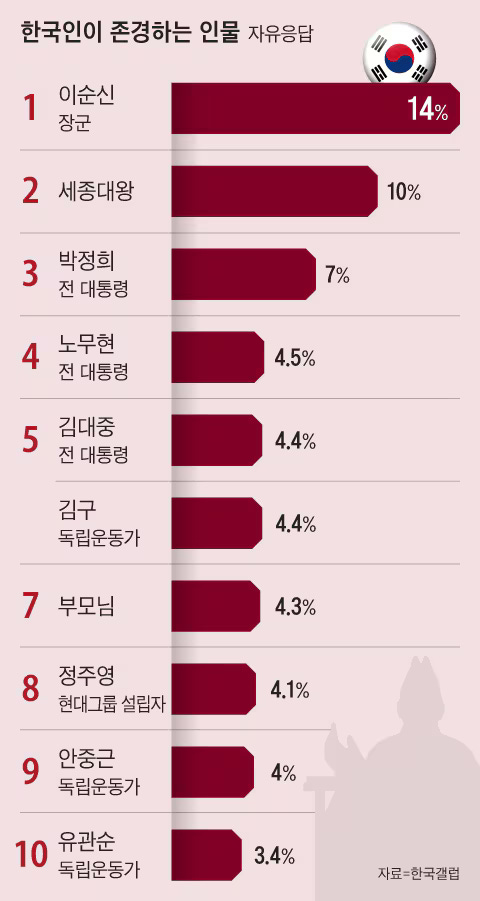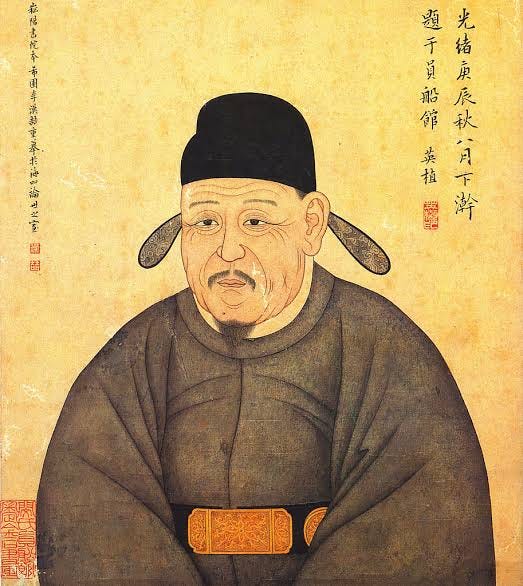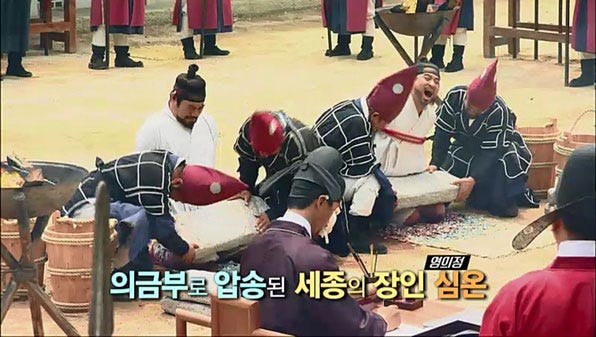When I was entertaining the idea of starting this blog, I began by jotting down some topics I could write about on a piece of paper. King Sejong (세종대왕, “Great King Seh-jong”) was on top of that list, followed by kimchi, geography, famous people, myths and legends, travel destinations, some crap about North Korea, a few vague items about history…
A little more than 2 years into it, I still haven’t touched King Sejong. I can’t even begin is more like it.
Gallup Korea takes a poll every 5 years (I think) on whom Koreans respect the most, historical figures or otherwise. The most recent survey’s results came out a few months ago and I was a little surprised that King Sejong wasn’t the overwhelming favorite.
Yi Soon-shin, Navy Admiral who saved the country from the Japanese invasion in late 16th century. ( >= Francis Drake & Horatio Nelson, in my humble opinion)
King Sejong, 4th King of Joseon Dynasty, creator of Korean writing system
Park Chung-hee, former President 1961(1963)~1979, assassinated.
Roh Moo-hyun, former President 2003~2008, suicide.
Kim Dae-jung, former President 1998~2003, passed away in 2009.
Kim Goo, independence fighter, assassinated.
(Poll takers’) Parents
Chung Joo-young, founder of Hyundai Group of companies, passed away in 2001.
Ahn Joong-geun, independence fighter, hung to death.
Ryu Gwan-soon, independence fighter, died from torture.
The list is a little recency biased and I have a slight issue with 3 names but all in all it’s okay. Not a huge deal.
In order to talk about King Sejong, we have to first talk about his father—there’s just no way around it. King Tae-jong, the 3rd King of Joseon and the 5th son of its founder, Yi Sung-gye (이성계).
King Tae-jong’s birth name was Yi Bang-won (이방원) and he is the only King in all of Korean history who is more often called by his birth name than his official royal title. With the English language now being a part of everyday Korean lives, he is sometimes known as “Kill Bang-won.”
So, what did he do to deserve this unflattering moniker? (I’m sure you already know the answer.) Mind you, records indicate that even the common people of Joseon referred to him as “Bang-won,” a sign of ultimate disrespect.
People usually don’t think about overthrowing a dynasty that has lasted almost 500 years unless there is something wrong in a big, big way. And Goryeo at the time, late 14th century, was an unequivocal mess. Bang-won’s father Yi Sung-gye was a very popular and undefeated army general in Goryeo (not unlike today’s rock/movie star status) who knew that the country was in trouble and that it needed a radical reform. Like minded but on the side of a more gradual reform was Jeong Mong-ju (정몽주), a high-ranking Goryeo official and scholar who is one of the most respected historical figures in Korean history.
Amid escalating tension between the two factions (btw, Yi Sung-gye and Jeong Mong-ju were close personal friends), [1] Yi Bang-won with his henchmen smote Jeong in the head…
… with a mace and killed him in broad daylight on what is equivalent to Broadway in NY or Wilshire in Los Angeles while people were watching.
Soon after, Bang-won’s father Yi Sung-gye overthrows Goryeo and becomes the King himself in 1392—everyone knew it was going to happen, just a formality. All historians are in agreement that despite the brutal nature of Bang-won’s actions, he was probably one of the very few people that had a direct impact on the establishment of a new dynasty.

Okay, a new era begins but Yi Sung-gye (King Tae-jo, 태조) is a tired old man by this time. And the question of succession is the topic of the day. Tae-jo had a total of 8 sons from 2 wives, 6 from his first (last name Han) who died before Joseon and 2 from his second wife (last name Kang) who by default became the Queen.

Bang-won, as mentioned earlier, was the 5th and youngest son from the first wife (because the 6th son died early). Because Joseon’s founding philosophy was that the throne was to be passed on to the jeok-jang-ja (oldest son of legitimate wife) to avoid any kind of infighting among siblings, Bang-won thus had little to no shot at ascending to the throne.
To the surprise and dismay of the 5 sons from his first wife, Tae-jo named his youngest son, the second son of his second wife, Bang-seok (방석) the Crown Prince (세자) at the age of 10. There are a few different versions of how this came to fruition but to the eyes of Bang-won, this was designed by Tae-jo’s group of loyal lieutenants, led by Jeong Do-jeon (정도전). This Jeong, Yi Sung-gye’s right hand man, was the de facto architect of the plan to overthrow Goryeo and establish Joseon. The naming of the 10-year old Bang-seok as the Crown Prince is generally regarded by historians as a counter move to hold the strong-willed Bang-won in check.

During the 6th year of his father’s reign, in what can only be considered as a coup d’etat, Bang-won and his 2 immediately older brothers (the oldest of the 5, Bang-woo, was an alcoholic, never in the picture, and died a few years before & the oldest living brother was hiding somewhere when all this went down) basically attacked the Royal Palace, [2] killed Jeong Do-jeon, [3] his sons, and [4] closest allies (who in turn are his own father’s trusted advisors), including [5] his own brother-in-law (his sister’s husband), and demanded his father to strip Bang-seok of the Crown Prince title.
King Tae-jo had no choice but to comply. [6] Bang-won ends up killing both Bang-seok (방석) and Bang-beon (방번), both of his half-brothers and 16 and 17 years of age at the time.
Bang-won then “recommends” his older brother Bang-gwa (방과), who was hiding while all the killings were going on, as the next Crown Prince to his father, as a puppet, a placeholder. Only 8 days later, Tae-jo, once an invincible general and the founder of Joseon, abdicates and Bang-gwa ascends to the throne, as the second Joseon King Jeong-jong (정종). And it just so happened that Jeong-jong, despite having many sons, did not have one with his official wife. Therefore, no jeok-jang-ja, no one “qualified” to be the next Crown Prince.
What happens next? Another power struggle against his immediately older brother, Bang-gan and another civil war among brothers. Bang-won doesn’t kill him but instead kicks him out of Hanyang (Seoul). 2 years later, Jeong-jong abdicates (under pressure, of course) and Bang-won becomes the 3rd King in 1400.
Does it end? No. Next target? His own trusted lieutenants. Bang-won, or I should say King Tae-jong, frames and [7] kills 2 of his wife’s brothers—Min Moo-goo and Min Moo-jil—who have been unfailingly supporting him all throughout his power struggles. This along with [8] 2 other officials that “sided with” the brothers who did absolutely nothing.
6 years later, 2 other Min brothers (Moo-hyool & Moo-hwae) were framed with dubious allegations and [9] were forced to commit suicide. All 4 brothers of the Queen, and thereby the entire Min family was destroyed by Tae-jong.
I’ll someday talk about how Sejong, as the third son himself, thus not jeok-jang-ja, became King, but just know this. After Bang-won himself abdicates and has his son Sejong take over the throne, Bang-won [10] had Sejong’s father-in-law, Shim On (심온), tortured and killed while he, the sitting Prime Minister(!), was on his way back from a diplomatic trip to China.
Consequentialism: The results of certain course of action decides whether that action is morally right or wrong.
If we were to apply this philosophy to what happened in the late 14th and early 15th century in Joseon court, then someone casually nicknamed “Kill Bang-won” consummated one of the most heroic things in the entire 7,000-year Korean history.
Without his despotic measures and all the killings, a history-defining genius Yi Doh (이도, King Sejong’s birth name) would have never seen the light of day and the Korean language and culture not the same (not to say it is perfect by any means).
So, an ambitious man who was least destined to become King eventually did, and he chose the right—no, the most perfect—man to succeed him. And for that, and for that reason only, someone nicknamed Kill Bang-won is regarded as one of the most consequential Kings in all of Korean history.












Lovely storytelling and the family trees are super helpful! :) It's ridiculous how much killing of family there is in the Joseon dynasty...